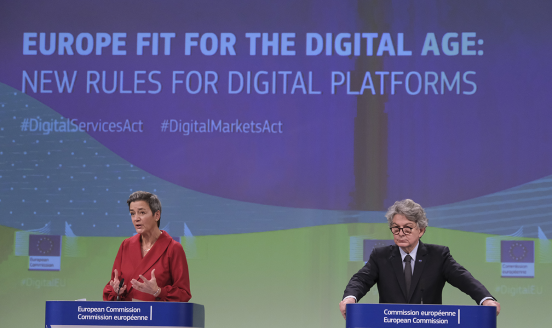Brussels drops the call on Europe's single digital market
The European Commission's reforms are too coy about making the changes that would create a true digital single market.
This article was first published in the Wall Street Journal.
If Europe had a genuine single digital market, every citizen and company could subscribe to any telecom operator active on the Continent. Pan-European operators could compete across different countries. New technologies would be profitable and rapidly deployed. High-speed access to the Internet would be available to all.
Unfortunately, the long-awaited telecom package unveiled Wednesday evening by Digital Agenda Commissioner Neelie Kroes will not get Europe there—or at least not as quickly as some hoped.
Achieving a single market for digital services requires a bold and coherent strategy. The European Commission should make clear that it prioritizes end-customers, whether they are citizens or businesses, for whom telecommunications is a primary means of fostering social cohesion within Europe and enhancing economic growth. More clarity on telecom policy would also spur investment and competition, to the benefit of European consumers.
Such clarity is absent in this week's reform package. The legislation was adopted without prior public consultation, creating speculation that the text was shaped by behind-the-scenes political pressure. The result can hardly be called a milestone in the path to a single digital market.
The Commission proposal only mildly addresses the issue of market segmentation, for instance. The creation of a single European regulator and the EU-level allocation of wireless spectrum would be the most straightforward way to overcome national fragmentation and promote the establishment of truly pan-European telecom operators. Instead, the Commission's proposal mostly relies on an "authorization system" under which operators doing business abroad would be regulated by their home regulator. This is no guarantee of enhanced competition, particularly if regulators are subject to home-country political pressure to back national champions at the expense of customers in host countries.
Likewise, the Commission is merely attempting to coordinate national spectrum auctions instead of encouraging EU-level auctions. Under this week's proposal, the Commission will retain a veto right if a licensing process creates barriers to the internal market. Yet this is still far inferior to pan-European auctions, which would encourage mobile operators to compete at a continental level rather than merely at a national one.
One of the Commission's flagship initiatives—to cap wholesale roaming fees—falls similarly short in this week's package. Earlier drafts proposed cutting roaming fees by up to 90% through the introduction of a €0.03 per minute cap on voice calls and €0.015 per megabyte for data transmission.
Roaming fees are high in Europe because customers cannot "punish" a foreign operator that is charging too much for accessing its network. They can only subscribe—or not subscribe—to telecom operators in their home country. So regulating roaming fees makes sense if competition in the wholesale roaming market cannot be guaranteed.
In the Commission's final proposal, however, these limits have been dropped. Instead, the proposal promotes the creation of "multilateral roaming agreements": Two operators in such an arrangement would treat each others' customers largely as their own, and charge roaming fees accordingly. But cooperation agreements may be viewed with suspicion by antitrust authorities, which could make operators less eager to participate.
The Commission's approach will also affect so-called "alternative roaming operators," which are operators to which mobile customers can separately subscribe when using their devices outside their home country. Brussels previously endorsed this business model as a way to contain roaming costs, but under this week's proposal, operators in multilateral roaming arrangements would not be forced to give alternative roaming operators access to their networks. This would make it risky for such operators to enter the market, which could open further possibilities for anticompetitive abuses.
The Commission, in other words, recognizes the existence of a market failure and announces that excessive roaming fees will be slashed. But in the final proposal, it has introduced more uncertainty than there was before.
The proposal's approach to net neutrality does not provide for much more certainty, either. The Commission proposes harmonization of the relevant European legislation, leaving open the possibility for operators to offer different levels of service quality at different prices, provided the principle of an Internet open to all is preserved.
Economic theory suggests that price or quality discrimination are not necessarily bad for customers. Varying the price of Internet services in line with their burden on network capacity might enable more efficient allocation of Web traffic. So the Commission's proposal is probably correct on substance.
Yet price discrimination could lead to antitrust abuses: Operators could, for instance, charge mobile users more for using services, such as Skype or Google Talk, that represent a competitive threat. The success of the net-neutrality regulation will therefore depend on national regulators' and antitrust authorities' ability to identify anticompetitive behavior and enforce competition law in a timely manner.
The Commission's proposal introduces some positive changes, but it is too coy. Above all, it fails to foster the development of a new digital era in Europe, which would bring certainty and confidence to consumers and to the industry.



